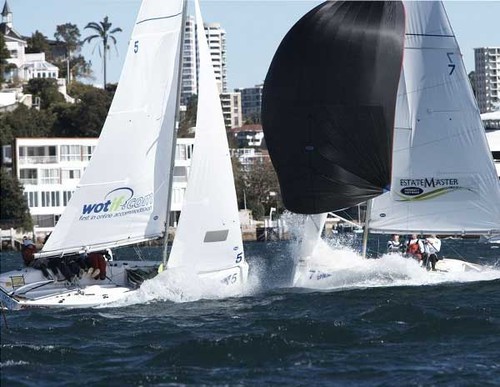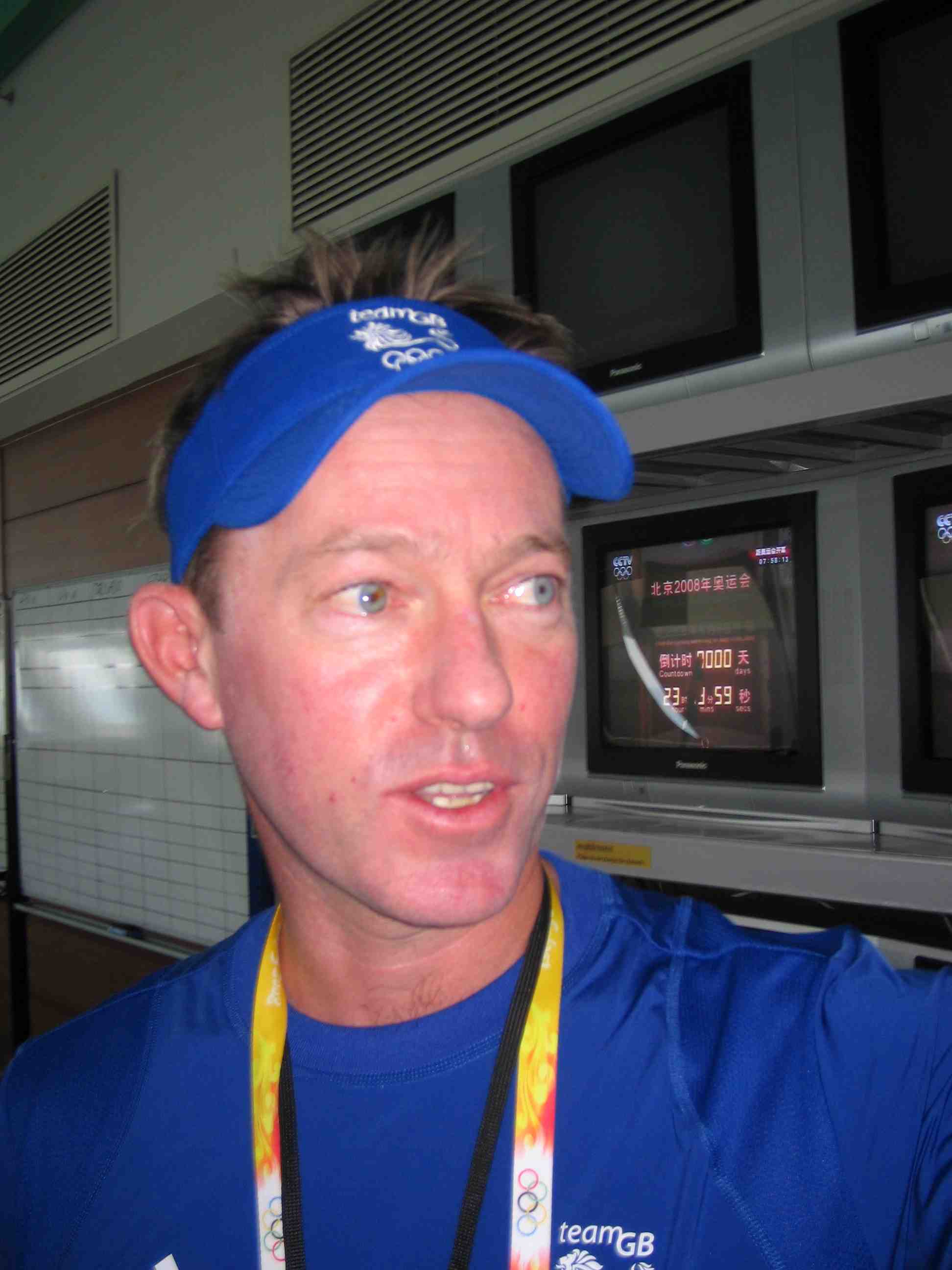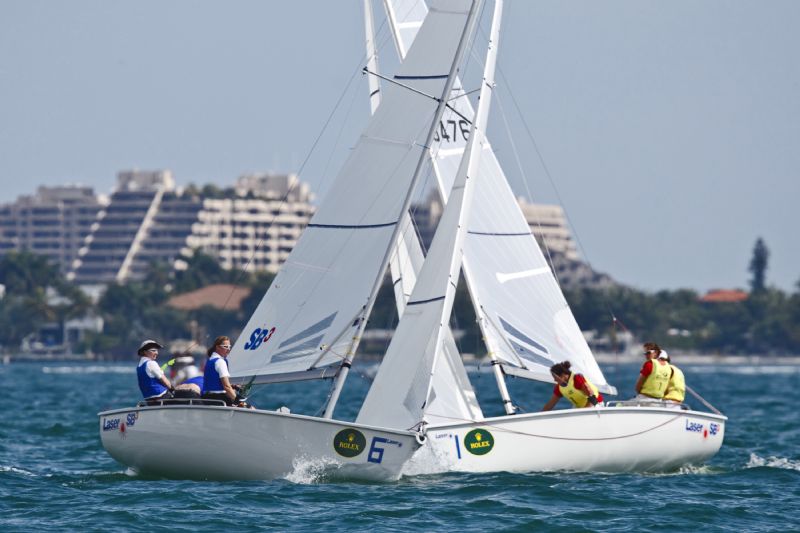This season marks the first year of the new Olympic discipline, Women's Match Racing. The replacement event for the Yngling fleet racing, supporters of match racing said it would attract more women into Olympic competition. After winning a close vote against a women's high performance dinghy in November 2007, the next task was to work out a format for the new Olympic discipline.
A year later, at the ISAF Conference in November 2008, scant progress had been made and there was little clarity as to how Women's Match Racing would be implemented. However, it was decided that the Elliott 6 Metre keelboat would become the equipment of choice and that sailors would bring their own boats to competition.

Elliott keelboats match racing in Sydney
Four months later and it is not yet clear when sailors will be able to take delivery of the first Elliotts. Even so, in January Miami Olympic Classes Regatta went ahead with a match race event by providing a fleet of Laser SB3s and attracted 12 teams to the regatta. Not a bad start.
Next major event was set to be in Palma, the Princess Sofia Trophy in April. However a lack of entries has caused the organisers to cancel the women's match racing. Later the same month it's Hyeres Olympic Regatta in the South of France. Again, women's match racing cancelled due to lack of entries. Both events could have taken up an offer from Laser Performance to provide rented Laser SB3s in similar fashion to Miami OCR, but with the lack of concrete interest from sailors the organisers were not prepared to commit themselves to the financial risk.
Sixteen months after women's match racing was voted in as an Olympic discipline, it appears to be in disarray. SailJuice rang up Stephen Park, the RYA's Olympic Manager, to get his perspective on the situation. Here is his assessment:
SailJuice: With the cancellation of women's match racing at Palma and Hyeres, what do you make of the situation?
Park: The World Cup program has not managed to work with the events to make them happen. There are a number of reasons for that:
· They don't have boats that are appropriate for the event.
· The events weren't able to get confirmation from member national authorities (MNAs) that there were going to be 20 entries to those events.
On that basis, the events didn't feel they could take the financial risk of renting SB3s with a special deal that Laser Performance had set up for those events. They'd offered a deal where they'd have two or three events one after the other, then they'd take the boats from event to event. There was a cost involved in that, and the events needed to make sure they had enough money to run it. The cost is not insignificant as you saw from the cost of the entry fee in Miami [US $2500].

Stephen Park at the 2008 Olympics in Qingdao
The worry is that lots of these things could have - and should have - been thought about well in advance. They decided that match racing was going to be an event in November 2007. It's not just that the Elliott 6Ms aren't suddenly available, they decided in November what the equipment was going to be. Unless the boats were built in Spain it was always going to be tricky to get the boats to Palma on time. So clearly there needed to be some thought about how that was going to happen.
The worrying thing is what's going to happen next? Which event is actually going to have match racing? When is the world of match racing going to come and what are the messages that that sends out to the world of women's match racing, and how ISAF sees it in terms of being a serious World Cup discipline? Palma and Hyeres have been cancelled. The Holland Regatta is not yet confirmed and I believe they're discussing using Ynglings. Now unless they were able to get the top 10 boats in the World, which were the top 10 boats at the Olympics which I do believe were well matched, then boats further down than that are not particularly well matched. We've got two older Ynglings for example, and they're not particularly well matched. The obvious thing is that a good Yngling sailor is likely to do better than a non-Yngling sailor who may be a good match racing skipper but only got in the boats the day before. So is it actually an Yngling race rather than a match race?
Then the next event is Kiel. Kiel have got a fleet of boats that they could use, but the problem is that the Women's International Match Racing Association (WIMRA) - they've got an event on which clashes with Kiel. The [WIMRA] event is in - 38ft five- or six-person boats, which is immediately prior to the World Championships which are in six-person 40ft boats, so it would appear that going to the WIMRA event is far more relevant to the World Championships than going to Kiel. So if they're not careful, if the top teams do that event instead, then Kiel will be in the situation where they won't have adequate entries to make match racing financially viable. So there's a risk you could get to September before you realise whether there'll be any match racing at the Skandia Sail for Gold regatta, and at that stage, you've got to be confident about whether there will be enough Elliott boats in the UK to run the match racing.

© Rolex/ Dan Nerney - Laser SB3s were used in Miami OCR at the beginning of the year
SailJuice: Bearing in mind the offer of boats that Laser Performance were making for Palma and Hyeres which have now been cancelled, one wonders whether the Laser SB3 would be the more practical option at this stage...
Park: Practical? Yes - in the sense that you can buy a boat now and Miami was run in SB3s and they'd had an event prior to the November conference in the Laser SB3s. The boats are available off the shelf, so I suppose in that regard, yes, it's more practical. Whether it's a better boat for the job than the Elliott, I wouldn't like to say. That's because we haven't actually seen an Elliott 6m match race boat in its finished form. But presuming that due diligence has been done and boats are being selected for that are OK, that's great. As and when they're available, they can distribute them around the world. I believe there's a certificate somewhere of the orders which have been placed via ISAF. But there is a big difference between people who have expressed an interest and people who are going to spend the money to place the deposit to actually secure the boats.
SailJuice: Your job is all about winning medals for Great Britain at the next Olympics, so what practical solutions are you coming up with for your women's teams in the UK?
Park: We're quite fortunate in as much as we do actually have some match racing boats, specifically for match racing, in the J/80s. If we wanted to do some SB3 work there are quite a lot of SB3s around the south coast of England. It would be relatively easy for us to do that. But one of the worrying things for women's match racing, and one of the key reasons - in my view as an observer of the ISAF Conference in 2007 - on which they voted it in was the argument which was sold to lots of nations - that it opened up competition to lots of smaller nations. It didn't require them to have all the equipment or lots of individuals buying boats. There were lots of events that people could turn up to, but of course that's not actually happened - other than through the WIMRA circuit, and that's difficult for MNAs to support because it has varying numbers of athletes for each event and so you have to have a high number of sailors involved.
But in terms of the UK, we're able to run our own match race program using our J/80s and that's indeed what we're doing now. We'll try and get hold of some Elliotts as quickly as we can. We've placed an order and are waiting to hear from ISAF as to when that will be and once we get those boats we'll obviously start training and racing in those. And then obviously we'll have enough boats between ourselves and other nations nearby to have a minimum of eight boats to use at the Skandia Sail for Gold regatta which is the plan that the competition manager has in mind, that we are going to run Elliot 6m racing at the event in September.
SailJuice: Although it has some obvious problems at the moment, what sort of optimism do you have for the future of women's match racing in the Olympics?
Park: Well, I don't actually have a great deal of optimism for it in the future as an Olympic discipline. I'm optimistic as to how Great Britain will do in the match racing and I think we should do fairly well. There's been one event so far and we medalled at that event. The person who medalled is the current European Champion. I'm quite confident Britain will do well in it but I'm not particularly optimistic for it as an event for the Olympics going forward.
I think it's a shame the program hasn't been able to kick off into this World Cup circuit with a bit more immediate activity because I think that would set out the stall fairly well for that event. So that's disappointing and I think there is a lot of confusion between Elliott racing, World Cup racing, WIMRA racing, and clearly there is a need for better communication between the respective parties to try and get the calendar sorted out and make sure the path is clearer for the sailors.
SailJuice: Do the shortcomings of Women's Match Racing offer any hope of getting a multihull back into the Olympic Regatta?
Park: You'd never say never, would you! But no, I don't think so. I think that even if everybody sat round the ISAF Council table, when they meet in May, that the whole match racing effort was not going the way they wanted, I suspect they would still stick with it, right through to 2012. I think they would try to ride it through till then. I don't think there is any light at the end of the rainbow emanating from the the Elliott 6M. On the other hand, following the statement made at the ISAF Conference in November, there's no further statement saying that the 11th event will definitely not be at the 2012 Games, so one has got to think there's a little bit of optimism for that boat. Whether it's a multihull or a women's high performance boat is another matter and we believe that there will be some discussion about that at the May conference. Hopefully people will be looking at that as positively as possible so that, as when a decision is made, things can move ahead as quickly as simply as possible in line with the suggestions made by the President in November.
